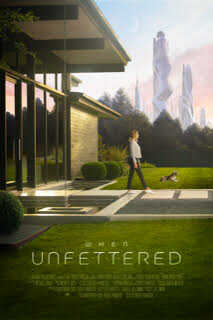With global conflicts, the rise of AI, and underrepresented people continuing to be marginalized, the world can be an overwhelming place. Some people can even become paralyzed with fear and cynicism. Or, if you’re Derek Franzese, you choose to tell stories that illuminate the best of people and life.
Related: Review: ‘When Unfettered’ Challenges the Divisive Perception of AI
In our exclusive interview, Derek discusses his short film, When Unfettered, which tells the story of an AI humanoid who discovers what it means to feel emotion after encountering and befriending a special child. The director and co-writer talks about his inspiration behind the story, what he wants people to know about working in indie film, and his goal of spotlighting underrepresented communities onscreen.
Cinemacy: It’s a pleasure to meet you, Derek. First off, your short film, When Unfettered, is a wonderful, heartwarming, and profound look at humanity. It also explores how life will change with the growing technology of AI. What was the original idea for this story?
Derek: Christopher Dick (producer and co-screenwriter) has been working with a company that is involved in AI for quite some time. We started discussing that most films, books, etc. show AI as this kind of evil. Even if it decides to help humanity, it generally decides the best thing for humanity is to eradicate it. So we wanted to go in this direction of showing that not all humans are awful, and perhaps when this being becomes sentient, it does so by seeing love.
So I went with the idea that the android, for lack of a better term, comes to feel her first emotion, love, by befriending these innocent kids. That she could see this immense compassion in communities that I don’t feel we as people give enough credit to.
Cinemacy: You co-wrote the film with one of the film’s producers, Christopher Dick. What was your writing process like? What ideas or themes did you want to ensure were in the story? And, were there any breakthroughs or discoveries when writing?
Derek: The process was essentially, we came up with the idea of AI learning to feel love, and then I ran with it. I’d send him drafts and he’d give notes but we were pretty aligned from the beginning so if I was stuck on something we’d quickly chat and we got the writing done pretty quickly.
As far as themes, I wanted to use Ash as a metaphor for so many of the issues in our world right now. It’s about immigration, racism, prejudice, being different than others, and how that affects us. As well as fearing things we don’t understand, innocence, the beauty of underrepresented people, and art and dance as something we should find our humanity.
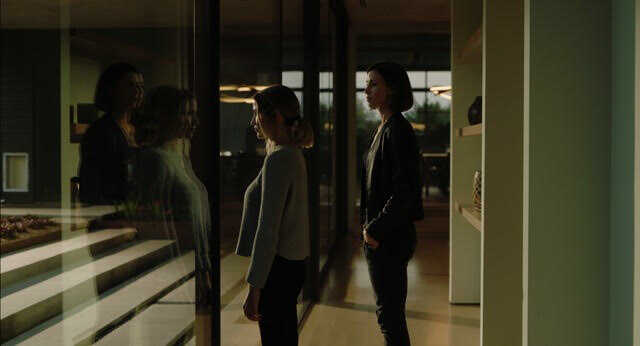
Cinemacy: When Unfettered follows a wide range of thoughtful emotions, such as grief when losing someone, anxiety over a technologically advanced future, and the feeling of connection with people. How did you set the various tones on set while shooting each of these different scenes?
Derek: We used the lighting in the opening scenes to establish this cold, sterile cool tone which I felt was a bit more of a representation of what we generally see as the future. A little more gloomy I guess but the scene where the father passes away I wanted to make sure was a little more of a serene time even though it’s still this empty room.
We kept the set while filming at the house more peaceful and a little more somber to help the actors and when we did the death scene, we cleared most everyone out and let Carly and Natalie just go with what they felt. Once Ash left the house, we tried to just have fun, create some things for her to discover, and keep it bright. We started the shoot filming the scenes with the kids so that was easy for us to make enjoyable.
Cinemacy: The film’s main character is an AI named “Ash,” played by Ashley Whelan. What was the casting process like? What direction did you give her for this character, and was there anything you discovered in the performance she brought to it?
Derek: Ashley and I have known each other for so long and we’d always wanted to work together so Chris and I had envisioned her in this role while writing it. We did our due diligence though and had a casting director help us get audition tapes from all over the US. We wanted to make certain. Probably watched more than 100 and Ashley was still the role.
One of the directions I gave was watching videos of what the “perfect” walk for a human would be since most of us walk improperly. We watched a lot of stuff from doctors and physical therapists so she could focus on that, to begin with.
Then we talked about micro-expressions but I’d been sharing the script drafts with her and she was already creating this character by the time she put herself on tape so I didn’t have to do much directing. She was just wonderful in how she showed this dryness but you cared about her. Not an easy character.

Cinemacy: I noticed that the film has a warm, inviting, and optimistic view of AI when some feel a bit more anxious about what that will mean for humanity. Do you feel more optimistic about AI versus pessimistic?
Derek: I don’t feel optimistic, honestly. I’m nervous about it but I wanted to show that maybe twenty years from now there will still be beauty on this planet, that we can still be wonderful as humans. That we won’t completely destroy all the plants and maybe the earth won’t be some nuclear wasteland. I think there may be some benefits for us with AI but When Unfettered, in my mind, really isn’t a comment on the positivity of AI. Ash is simply a representation of another thing humans will be frightened by and the prejudices of today.
Cinemacy: The film is beautiful, with two distinct looks: more formal, muted color shots in the opening scene of the home versus handheld, colorful images in the park. What direction did you give your director of photography, Joe Simon, to create these worlds?
Derek: Exactly what you just said. Let’s make the house more rigid and less welcoming. Everything should be more perfectly placed, cool blues. Since you have such a compact amount of time in a short film, we shot the house as if it were a character. “Sterile” was a word I used a lot.
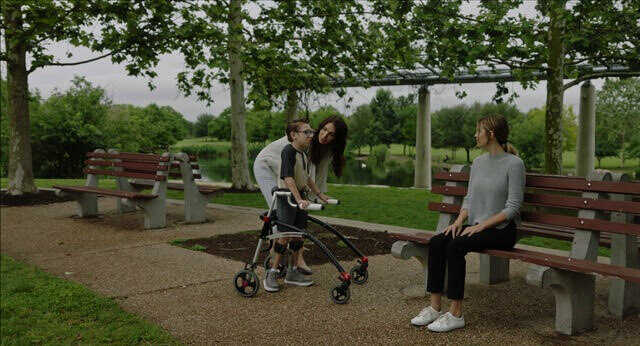
Cinemacy: You also feature kids of underrepresented communities, including disabled people in key roles. What was that like to write as well as shoot on the day?
Derek: Great. All around great. Filming with the kids was so much fun. We really just gave them an area and said let’s have a party. Some of them knew each other and some didn’t so we just followed them getting to know each other. It was authentic and I barely had to direct anything.
Writing was unique because I don’t have a lot of family with cerebral palsy or Down syndrome so I relied on friends with kids with those special abilities and I’d send the script to them and they’d tell me if I was far off in how they interact. Then one friend would ask if she could share the script with parents in the community. I’d change the little phrases but ultimately it became this collaborative film and that never changed. I felt it was so important for the families and kids to tell me what they wanted to do and I adapted to it.
Cinemacy: What do you hope audiences will take away after seeing this film?
Derek: Compassion and this understanding that even if we come from an underrepresented community, we still harbor prejudices and we all have work to do. The answer to so many of our issues is simply love.
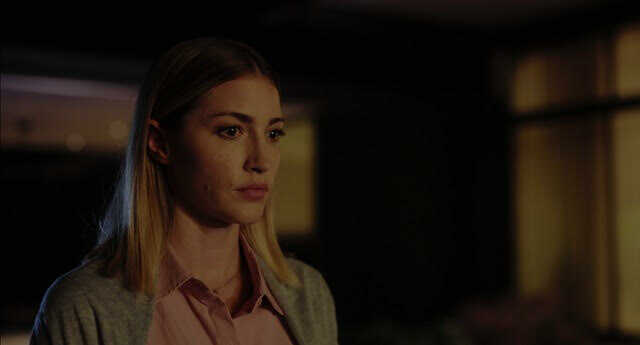
Cinemacy: Let’s get to know you more. Where are you originally from? Where did you grow up, and where do you currently reside?
Derek: I moved around quite a bit as a kid, from Orlando to DC to Columbus, Ohio but mostly I grew up in Cleveland, Ohio then went to high school in Houston, TX. My father was from Brooklyn so I spent a lot of my childhood going to New Jersey and NYC. My heart has always belonged in New York though I only lived in Brooklyn a year.
I live in Austin, TX now. I split time in LA because it’s one of those things you kind of have to do in the industry but Austin is home.
Cinemacy: What have been your most formative moments in filmmaking to date? Proudest?
Derek: My day job is that I’m an assistant director so I’ve been pretty lucky to work with a lot of really talented filmmakers and learn from them. One of the jobs that I was an AD on where I got to learn was Alita: Battle Angel. It was incredible to watch the filming processes of something with so many VFX shots.
As for my own work, When Unfettered, has been something both formative and proudest of. We shot with lots of kids and animals in parks and downtown so just accomplishing that is crazy in itself, much less during the summer of 2021 while the pandemic was still going on. It was also the first time I really had to trust other people as far as VFX or a composer after the shoot. Generally, I would just film things that I was capable of doing myself or have a song in my head that I knew we could license. I can’t do VFX myself so there was this unease about making things like that.
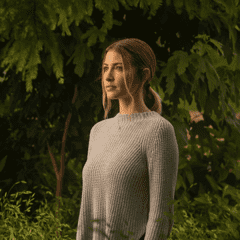
C: Who are your filmmaking heroes and dream collaborators? Do you have any next projects or ideas in the early stages that you’re excited about?
Derek: So many heroes, Akira Kurosawa, Fellini, Scorsese, John Huston.
I really, really want to work with Robert De Niro. He was probably the most profound influence on my seeing how powerful film can be when I saw Awakenings around 12. He’s been my favorite ever since then.
C: What have you learned about working in indie filmmaking that more aspiring filmmakers would benefit from knowing?
Derek: Just make stuff and try your best not to be discouraged. Make mistakes. Be bold.
I wish more established filmmakers were honest with aspiring artists about the reality of this industry and the film festival circuit. It really is rigged against you. It’s a circle and it’s designed to mostly keep you out. Some of these big festivals will never say it aloud but they may be taking two films a year that are from blind submissions. The agencies, studios, established filmmakers independent producers, etc. are all vying for the slots and there really just isn’t a large place for many unknowns at those festivals. Then you have festival distribution companies, aggregators, reps, and so many people who already have a foot in these circles.
So if you submit to those few dozen fests and you’re turned down, keep moving forward. Try the regional festivals. There are so many great festivals that are looking for less connected new voices.
C: What messages and themes are important to you that you wish to explore in your future work?
Derek: I adore anything that’s going to have any kind of poignancy. I’ve always wanted to make things that allow people to feel something and in general, what I write, tends to be something sociological. I’m fascinated with our relationships as humans amongst each other.
